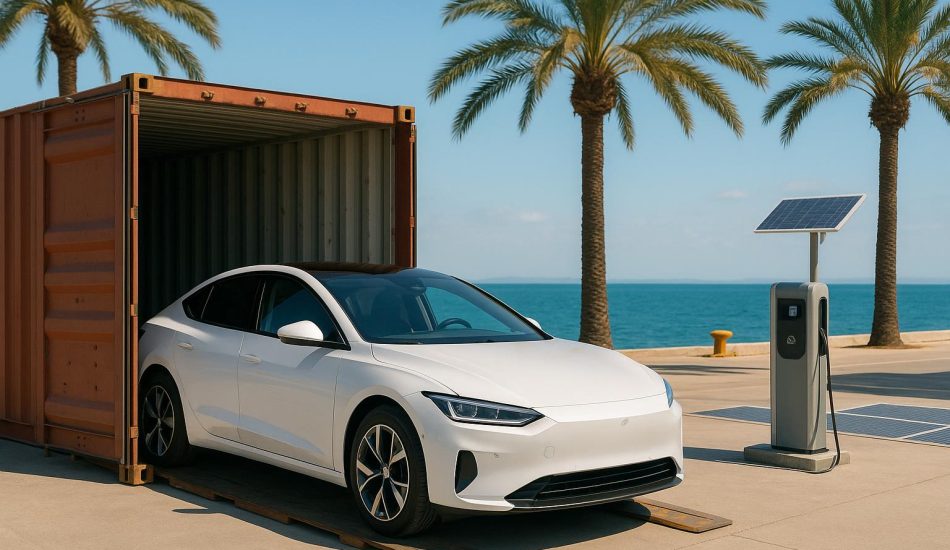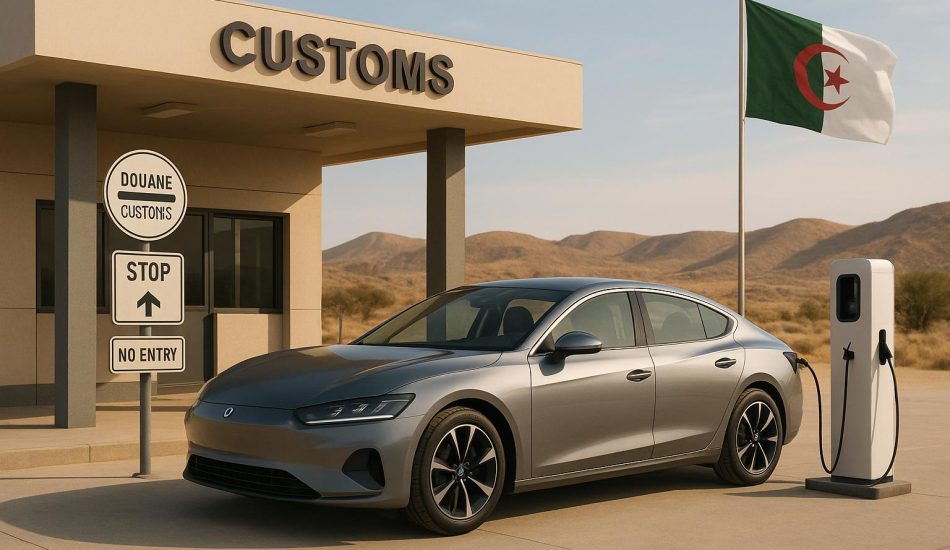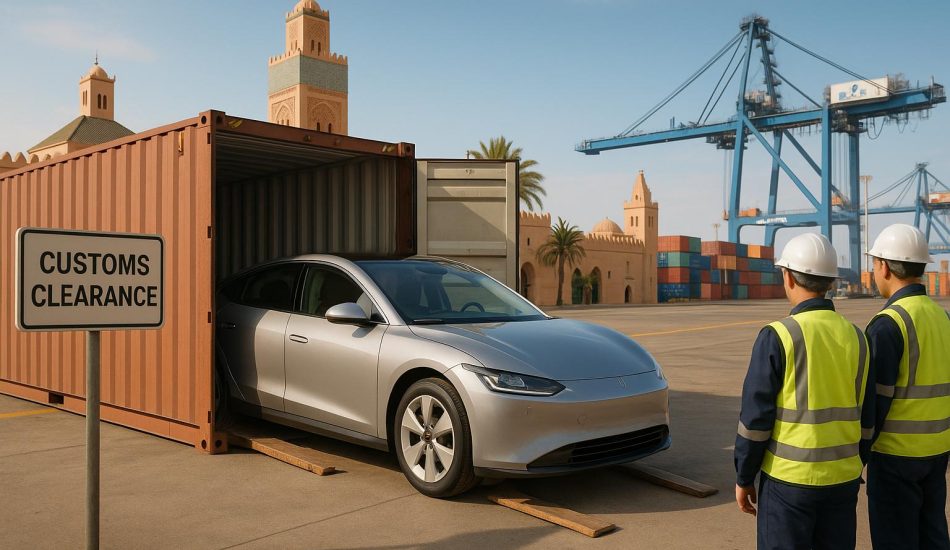
- Top EV Models: Options range from affordable Chinese brands like Changan Explorer ($530) and Geely Emgrand 7 ($845) to premium international models like Tesla Model Y and Hyundai Ioniq 5.
- Government Incentives: EVs are exempt from VAT and customs duties, making them more affordable compared to traditional vehicles.
- Charging Infrastructure: Mauritania is developing its EV charging network, supported by renewable energy projects like the $40 billion Aman project.
- Local Conditions: Extreme heat and dusty terrain require EVs with advanced thermal management systems and durable designs.
- Financing Options: Flexible payment plans and simplified import processes are available through platforms like EV24.africa.
Quick Comparison of EV Models for Mauritania:
| Model | Price (USD) | Type | Key Features |
|---|---|---|---|
| Changan Explorer | $530 | Compact SUV | Affordable, roomy interior |
| Geely Emgrand 7 | $845 | Sedan | Reliable, long-term dependability |
| Tesla Model Y | Premium | SUV | Long range (327–357 miles) |
| Hyundai Kona EV | Affordable | Compact | Ideal for city driving |
| Rivian R1T/R1S | Premium | Off-Road SUV | Adjustable suspension for terrain |
Key Takeaways:
- For Urban Use: Tesla Model Y or Hyundai Kona EV.
- Budget-Friendly: Changan Explorer or Geely Emgrand 7.
- Rough Terrain: Rivian R1T/R1S.
Mauritania’s shift to EVs is driven by its renewable energy potential and government support. Explore EV24.africa for options tailored to your needs.
BREAKING! $5K African EV CRUSHES Tesla in Range Test
Best Electric Vehicle Models for Mauritania
The electric vehicle (EV) market in Mauritania is evolving, offering a mix of affordable options from Chinese manufacturers and premium models from international brands. Choosing the right EV depends on understanding how each model performs in local conditions. Below, we highlight some of the top choices, their features, and pricing details in Mauritania.
Popular EV Models and Their Features
Chinese Brands Leading the Market
Chinese automakers have carved out a significant niche in Mauritania by offering affordable EVs packed with features tailored to the region.
- BYD Leopard 5: A premium SUV designed to handle Mauritania’s demanding climates, offering luxury features and robust performance.
- Changan Explorer: A compact SUV that delivers excellent value with a roomy interior and dependable performance on both paved roads and rougher terrains.
- Geely Emgrand 7: A standout sedan known for its reliability, making it a solid option for those prioritizing long-term dependability.
International Options Making Waves
International brands are also gaining traction in Mauritania, offering advanced technology and impressive performance.
- Tesla Model Y: Known for its exceptional range of 327–357 miles, this model is perfect for long road trips across Mauritania’s expansive landscapes. Its thermal management system and intuitive route-planning software add to its appeal.
- Hyundai Ioniq 5: This model combines fast charging capabilities with a spacious interior. Its inclusion of a NACS port, which connects to Tesla’s Supercharger network, makes it a practical choice for drivers seeking convenience and accessibility.
Urban-Focused EVs
For city dwellers and those with shorter commutes, these models shine:
- Hyundai Kona EV: An affordable and compact option, ideal for navigating city streets. Its practical range makes it a go-to for urban mobility.
- Xpeng G9: Packed with advanced driver assistance systems, this model ensures a safer and smoother driving experience in busy urban settings.
Pricing and Availability
Mauritania’s EV market offers options to suit a variety of budgets. From entry-level models to luxury SUVs, there’s something for everyone.
| Model | Price Range (USD) | Category | Key Advantage |
|---|---|---|---|
| Changan Explorer | $530 | Compact SUV | Most affordable |
| Changan Yidong | $585 | Sedan | Urban efficiency |
| Leapmotor C11 | $670 | Mid-size SUV | Tech features |
| Geely Emgrand 7 | $845 | Sedan | Proven reliability |
| Shineray X30lev | $950 | Compact | City driving |
| Xpeng G9 | $1,170 | Premium SUV | Advanced tech |
| Rox Motors Rox01 | $1,535 | Local assembly | Local service network |
| BYD Leopard 5 | $2,260 | Premium SUV | Luxury features |
In China, the affordability of EVs has driven their popularity, with nearly 95% of small car sales being electric in 2024, up from 75% just three years earlier. This trend is beginning to influence African markets like Mauritania, making EVs an increasingly attractive choice.
Where to Find These Models
For those looking to purchase EVs, local dealerships in Nouakchott offer a variety of Chinese brands. For a broader selection and financing options, platforms like EV24.africa provide detailed listings tailored to the Mauritanian market.
Charging Infrastructure and Maintenance in Mauritania
Mauritania’s electric vehicle (EV) charging landscape is steadily advancing, driven by renewable energy projects and government initiatives. Although still in its early stages, the country is laying the foundation for a charging network that aims to serve both urban hubs and remote areas.
Public and Private Charging Infrastructure
Current Infrastructure Growth
The EV charging market across the Middle East and Africa is on a sharp upward trajectory, with projections estimating growth from $162.5 million in 2024 to nearly $380.7 million by 2029, reflecting an annual growth rate of 18.56%. Mauritania is aligning itself with this trend by investing heavily in renewable energy, which supports both public and private charging infrastructure development.
Key Projects Shaping the Future
Several major initiatives are transforming Mauritania’s energy landscape and laying the groundwork for a reliable EV charging network:
- CWP Global‘s AMAN Project: Positioned in the Dakhlet Nouadhibou and Inchiri regions, this is one of Africa’s largest green hydrogen projects. Powered by wind and solar energy, it not only supports EV charging infrastructure but also creates jobs and drives economic activity.
- Société Mauritanienne d’Electricité (Somelec): The national electricity provider is enhancing the renewable energy grid through projects like the NOUR solar initiative, which integrates clean energy into the national grid and enables EV charging stations.
- KLIMA Solar Farm: This community-focused solar project allows individuals to invest in renewable energy production. It supplies a significant portion of the country’s energy needs, showcasing how local efforts can align with EV infrastructure goals.
Home Charging and Solar Integration
Mauritania’s abundant solar resources make private EV charging a practical option. Projects like the Boulenouar Wind Farm, which will be the largest in the country, are set to expand renewable energy capacity, further supporting home charging solutions.
International Backing for Charging Infrastructure
Organizations like Enabel, the Belgian Development Agency, have been supporting sustainable energy projects in Mauritania since 2017. Their work focuses on improving access to renewable energy, which directly supports the development of EV charging infrastructure and maintenance services. The government’s broader commitment to achieving full energy coverage by 2030 underscores its dedication to integrating EV solutions across the country.
Maintenance and Support Services
Growing Service Networks
As the EV market in Mauritania expands, so does the demand for maintenance and support services. Local EV companies are emerging, and international providers are entering the African market. For instance, Driivz announced comprehensive support services for Level 1 and Level 2 EV charge point operators, starting in January 2025, signaling a shift toward professionalized EV support.
Key Maintenance Considerations
Mauritania’s climate presents unique challenges for EV owners. High temperatures exceeding 104°F (40°C) can impact battery performance, making regular software updates and thermal system checks essential. These measures are critical to ensure vehicles operate efficiently in extreme conditions.
Developing Local Expertise
Building a local EV manufacturing and service industry could boost Mauritania’s economy by creating jobs and fostering technical expertise. Educating consumers through targeted campaigns is equally important to build trust and confidence in EV technology.
Digital Platforms for Maintenance
Platforms like EV24.africa are making it easier for EV owners to access maintenance services. These digital tools provide detailed information on local service providers and the specific needs of various EV models in Mauritania. By linking these platforms with the country’s renewable energy goals, they create a seamless connection between technology and sustainability efforts.
sbb-itb-99e19e3
Government Policies and Financing Options
Mauritania is making strides in improving access to electric vehicles (EVs) through financial incentives and simplified import processes. The government’s focus on sustainable transportation is reflected in these initiatives, which provide both financial and logistical support for EV buyers. These efforts align with the country’s vision to become a leader in environmentally friendly transit solutions.
Government Incentives and Tax Breaks
Starting in 2025, 100% electric vehicles in Mauritania will be exempt from both VAT and customs duties. In contrast, traditional vehicle imports are subject to a 10% import duty and a 12.5% VAT. Beyond this, the Ministry of the Economy has reduced internal taxes and gradually lowered import duties for traditional, hybrid, and electric vehicles. These financial incentives are designed to encourage the adoption of EVs and contribute to the nation’s sustainability goals.
Financing and Payment Plans
To complement these tax benefits, Mauritania offers flexible financing options and streamlined import services, making the shift to electric mobility more accessible. Platforms like E2W Africa play a key role by providing growth equity and small-scale asset financing to support the EV market in East Africa.
Additionally, EV24.africa simplifies the import process for Mauritanian buyers, managing everything through the Port of Nouakchott. They offer flexible purchasing arrangements, such as Delivered Duty Paid (DDP) and Free on Board (FOB) options. This integrated service makes it easier for buyers to navigate the complexities of international shipping and customs.
Shipping costs for EVs from Germany to Mauritania range between $1,975 and $3,875, with local charges averaging around $1,500. According to a 2022 analysis by McKinsey and Shell, EV sales in select African markets are projected to reach between 340,000 and 820,000 units by 2025, with growth expected to hit 3.8 to 4.9 million units by 2040.
EV24.africa sources vehicles from regions including Europe, Asia (China), North America, and Japan. This global reach ensures Mauritanian buyers have access to a wide selection of EVs, while the company handles all aspects of shipping and customs clearance.
How to Choose the Right EV for Mauritania
Picking the right electric vehicle (EV) for Mauritania involves understanding the unique challenges posed by the country’s environment. With intense heat, dusty conditions, and diverse terrain, not all EVs are equipped to perform well here. Let’s dive into the key factors to consider.
Factors to Consider for Local Conditions
Handling Mauritania’s Heat
The extreme temperatures in Mauritania can be tough on EV batteries. These batteries work best between 60°F and 95°F (15°C–35°C), but performance can drop significantly once the mercury rises above 95°F (35°C). For example, at 100°F (37.8°C), range loss can hit a staggering 31%. To combat this, look for EVs with advanced thermal and battery management systems. These features help keep the battery operating efficiently, even in scorching heat.
Battery Performance in Stressful Conditions
When the temperature hits 95°F and the air conditioning is running, EV range can decrease by about 17%. To extend battery life and maintain performance, aim to keep the battery charge between 50% and 60%, avoiding full charges above 80%.
Tires and Terrain
Hot weather also impacts tires, increasing tire pressure by about 3 PSI when temperatures rise from 75°F to 105°F. This can affect handling, especially in Mauritania’s sandy and dusty conditions. For better performance, consider EVs with higher ground clearance and 4WD or AWD capabilities. These features improve traction and make navigating rough terrain much easier.
Smart Heat Management Features
Some EVs come with practical heat-related features that can make a big difference. For instance, pre-cooling the cabin while the vehicle is still plugged into the grid helps conserve battery life. It’s also wise to avoid rapid outdoor DC charging during the hottest parts of the day, as this can lead to thermal issues. Parking in shaded areas is another simple but effective way to reduce heat exposure.
The table below provides a quick comparison of EV models and their suitability for Mauritania’s conditions.
EV Model Comparison Table
| Model | Heat Performance | Best For |
|---|---|---|
| Tesla Model 3/Y | Excellent – advanced thermal systems with heat pumps and cabin overheat protection | Urban and highway driving |
| Hyundai Kona EV | Good – about 5% range reduction at 90°F | Mixed urban and rural use |
| Ford Mustang Mach-E | Excellent – 1% range loss at 90°F, 16% at 100°F | Long trips and highway performance |
| Chevrolet Bolt EV | Good – around 9% range decline at 90°F | Budget-friendly urban driving |
| Nissan LEAF | Poor – 22% range loss at 90°F | Short-distance urban use |
| Rivian R1T/R1S | Good – built for off-road with adjustable suspension | Off-road and rural terrain |
Top Picks for Mauritania:
- Urban Driving: Tesla Model 3/Y offers top-notch thermal management, while the Hyundai Kona EV provides reliable performance.
- Mixed Urban and Rural Use: The Ford Mustang Mach-E handles high temperatures well and delivers excellent highway performance.
- Budget Option: The Chevrolet Bolt EV is a solid choice for those prioritizing affordability with moderate heat tolerance.
- Off-Road Adventures: The Rivian R1T/R1S is ideal for rough terrain, thanks to its adjustable suspension and off-road capabilities.
If you’re browsing EV24.africa, focus on models with proven thermal management systems to ensure your EV can handle Mauritania’s challenging climate.
Conclusion
Selecting the right electric vehicle (EV) for Mauritania in 2025 requires careful consideration of several factors. Mauritania’s environment – marked by extreme heat, dusty conditions, and developing infrastructure – demands vehicles designed for durability and reliability. Additionally, checking the availability of charging stations in your area is critical to ensure the vehicle meets your daily needs. While global trends highlight the growing adoption of EVs, a localized approach is essential to determine their practicality in Mauritania.
The global EV market is expanding rapidly, and African nations, including Mauritania, are beginning to experience this growth. Increased accessibility in emerging markets is fueled by international manufacturers entering the region and favorable changes in import policies.
Government initiatives also play a key role, with incentives and supportive policies encouraging EV adoption.
"This operation represents a significant step forward in the country’s efforts toward more efficient and accountable public spending, ensuring that resources deliver maximum impact for the Mauritanian people, particularly in health, education, and social protection"
- Ibou Diouf, World Bank Country Manager for Mauritania
To make your transition to an EV smoother, consider the following steps:
- Assess charging infrastructure in your area.
- Compare models designed for harsh environments.
- Explore financing options and government incentives.
For those looking to simplify the process, EV24.africa offers a one-stop solution for finding and importing electric vehicles. Their platform features a wide range of models from leading brands like Tesla, BYD, Volkswagen, XPeng, Mercedes-Benz, and others. With transparent pricing, flexible financing options, streamlined shipping, and full customs clearance, EV24.africa ensures a hassle-free experience.
Visit EV24.africa to explore available models, compare specifications, and get expert guidance tailored to your needs. Their door-to-door service and dedicated support team at [email protected] make navigating the EV market in Mauritania easier than ever. By following these steps and leveraging the insights shared above, you’ll be well-equipped to embrace electric mobility in Mauritania.
FAQs
What should I look for in an electric vehicle that can handle Mauritania’s hot and dusty environment?
When picking an EV for Mauritania’s challenging environment – characterized by intense heat and dusty conditions – it’s crucial to focus on models equipped with advanced thermal management systems. These systems, including battery insulation and active cooling mechanisms, are key to preventing overheating and ensuring the vehicle performs well in high temperatures.
Durability is another major factor. Opt for vehicles specifically designed to withstand tough climates and make sure they come with strong air filtration systems to manage the dust. To handle sandy or uneven terrain, prioritize models with good ground clearance and stay on top of tire maintenance for smoother navigation.
What steps is Mauritania taking to expand its electric vehicle charging network?
Mauritania is taking steps to grow its electric vehicle (EV) charging network, aiming to keep up with the increasing use of EVs. The country is focusing on setting up more charging stations, particularly in cities and along key transportation routes.
This progress is being supported by international funding, including renewable energy projects funded by organizations like the World Bank. These initiatives are not only boosting the country’s overall energy capacity but also helping to expand EV infrastructure. With ongoing investments, Mauritania is gearing up to meet the demand for EV charging and promote a greener, more sustainable transportation system.
What incentives does the Mauritanian government offer to make electric vehicles more affordable?
The Mauritanian government offers tax exemptions on fully electric vehicles, effectively reducing their upfront costs. This move is aimed at making electric vehicles more affordable and encouraging people to choose them over conventional gas-powered cars.
By easing the financial burden, these incentives make electric vehicles a more appealing choice for buyers, helping to promote their adoption across the country.




